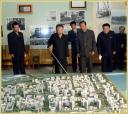According to the Choson Ilbo:
Korean reunification risk is the biggest drag on South Korea’s sovereign rating, according to an expert at ratings agency Standard and Poor’s.
David Beers of S&P on Monday said, “Korea unification, that’s going to be very economically and financially challenging for South Korea, because of the huge gap in income levels of the two countries.”
German reunification cost a lot of money despite the narrower economic gap between East and West Germany. The U.S-based global credit agency has kept South Korea’s sovereign rating unchanged at A since July 2005 — two notches lower than AA-, the rating given before the Asian financial crisis in the late 1990s, because the potential cost of the Korean reunification has been increasing, he said.
Beers also pointed to the war risk between South and North Korea as a hurdle to raising South Korea’s rating, even though the likelihood is slim.
The “stable” outlook means that there is a slim chance of a change in the country’s rating for two years to come, he added.
Beers was positive about the country’s reduction of short-term foreign debts since the global financial crisis in 2008 and predicted it will be ready to avert another global liquidity crisis.
An S&P inspection team led by Beers is in Seoul to attend an annual consultation about the rating from Wednesday to Friday.
Read the full story here:
N.Korean Risk ‘Biggest Drag on Seoul’s Credit Rating’
Choson Ilbo
7/13/2010

